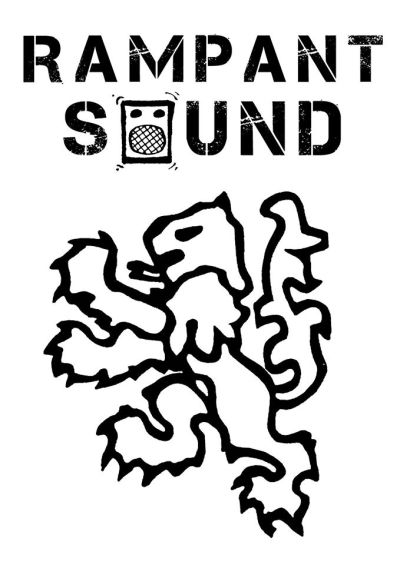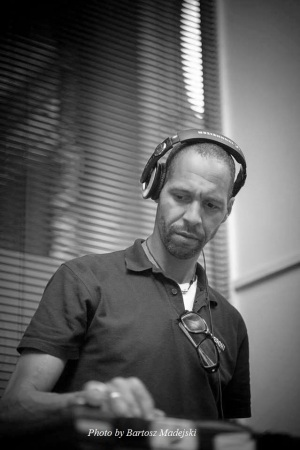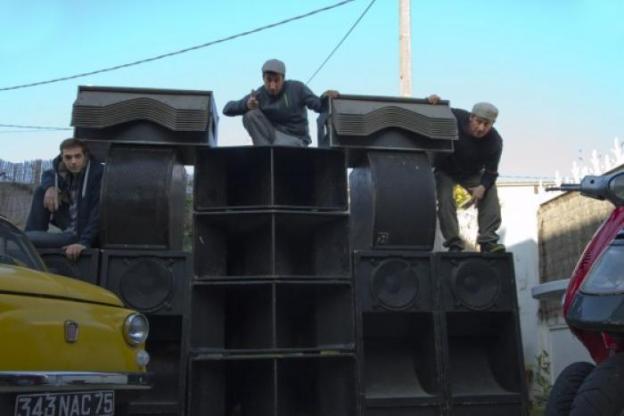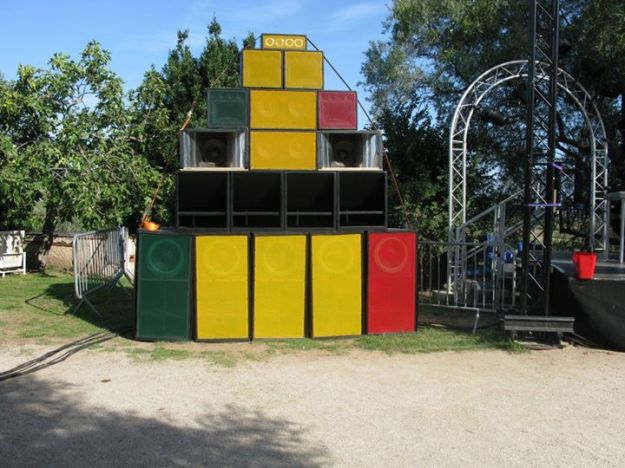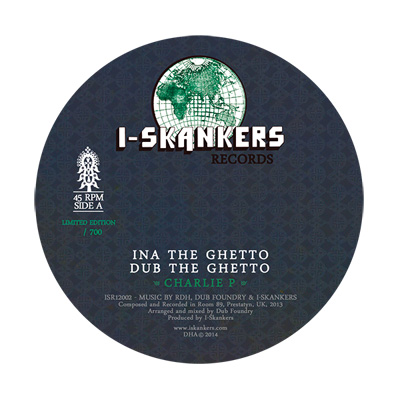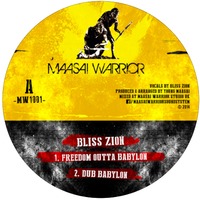“You have to remember that in the early 90s that was when things got really clamped down in Glasgow. You had the Criminal Justice Bill coming in; you had a curfew in Glasgow, you had to be in the clubs by 12. The illegal parties and illegal gathering were really clamped down upon, with the whole repetitive beats thing and all that. It was quite heavy in those times.”
I had the opportunity to talk to Paul and Alan, aka. Doctor Dub and Professor Collie, the original Rampant Sound, at their first return behind the decks in over ten years. We discussed how they began as a sound, the Glasgow music scene in the 90s, as well as their thoughts on the current sound system culture in Britain and Scotland.
So what was the glasgow scene like when you started ?
Alan : Well there were a few things. There were a few a guys with connections with Rubadub Records, they played out in 13th Note originally. They had an event, like an ambient night as well called Sonar I think – with people like Dribbler, and Dave Heart and State of Flux played at it.
Before us, there was a guy in the kind of 80s…
Paul: There was Joseph too. He was from Edinburgh but he was more of an eclectic mix, it was like soul, funk, a bit of reggae. His DJ name was Joseph of Babylon.
Alan : I heard he’s become a muslim now, and he’s really into acid jazz, and funk and stuff.
But there was a guy even before that, quite a long time ago – in the 80s – from East Kilbride ; and that had Dillinger, and Steel Pulse and all sorts of people playing in community centres in East Kilbride. But that was way before us. When we started in ‘91-‘92.
Paul: ’92 probably because we got that gig in January – in the place which is now 13th note, when it was on Glassford Street… That was always a good venue. And yeah, in January of ‘92 – because I arrived in Glasgow in ‘91. And we did a mix night with Joseph a couple times, he came down from Edinburgh.
Then we went from under Ventura to a night at the Art School. A few soundclashes with Soundclash,
Alan : we also played with Mungo’s who were called the Dub Dentists at that point. And we played a few gigs with them.
Paul : that was early 2000 though
Alan : oh yeah that was second time round. I’m getting ahead of myself. So yeah in the early 90s we played at the Art School, and then we had Zion Train up, Revolutionary Dub Warriors.. and who was the other one again ? With the ex-specials in them ?…
Anyways, we had a few guys coming up and playing with us.
And then we went down and played in London, at the St George Robey. It was a pub, with a dance space in the back. And then we played at quite a few parties, with connections from Pussy Power – Terry and Jason.
Terry got Twitch’s first gig – Keith – from Optimo. And we also did a few things with this band called State of Flux, which was a guy – Dave Clark – who now records for Optimo and Numbers under the name Sparky. We did a few parties with them. The Beach Coma party…
And that was all early, mid-‘90s ?
Alan : Yeah. And then we took a rest. Had kids…
Paul : Yeah, life got in the way (laugh).
Alan : And then we got back into it, continued to play.
Paul : You know, we’ve only been dub-jockeys, dub DJs. We grew up listening to Shaka, going to Shaka gigs. But we didn’t have the equipment. Glasgow’s a techno city, it was a lot of dance. And you’ve got to try and mimic that, the way they play the records and tunes, so we mixed and scratched the tunes too. Then we got an echo box, an echo chamber, in order to make it sound like a sound system, over whatever we were playing. And then when we came back in 2002 and started to move more into using a sound system, we had a guy that we knew, that would upright the sound, he was our sound engineer. And he was responsible for the system. That limited it a bit, but it also opened it up to some new people.
But then it meant we were always reliant on running our sound system, and where we were in our lives at that point it was a bit too much. Because you know, it’s having a van, and it’s being on the road a lot. And after a while it was just too much, we didn’t have the time.
Alan : The one thing I regret not doing at the time is going in the studio.
Paul : I still want to do it now. I’d do it tomorrow if we could, because there are tunes there that need remixing. We always had a particular style as well, we like our dub. We like our vocals, our version, and we like our dub. We don’t like ska, or whatever.
Alan : We don’t like it when it’s too diluted.
Paul : It’s all about the bass line to me. I mean you can put anything you want over the top, if you get that right, then that works.
You know, I can play you a tune that’s maybe 40 years old and you’ll go « well that’s drum and bass ».
Did you have at some point any releases ?
Paul : No we didn’t, but we recorded a lot of our session, and even now they really hold up.
Alan : but that’s the one thing I regret is not releasing anything original, you know. And I think if we had kept our relationships with the likes of Zion Train and stuff, it would have probably come to that at some point. One friend of mine in particular still makes tunes, and had 2 or 3 releases on R&S label. We went into his studio a couple of times, and we kind of just started to get to know the machines. But it didn’t come to anything really.
But we listen back to some of the sessions and you can see how our inspiration and our musical thought processes were changing. I was listening to this one CD recently, and it’s kind of organic, and it’s quite lush sounding. And then you listen to another one and its very steppers, it’s very rigid.
There was a lot of good stuff coming out in the mid to late 90s, quality releases. A lot of really seminal releases.
So in the ‘90s, doing reggae and dub in Scotland there was you guys and anyone else?
Alan : Messenger. there was Messenger in Edinburgh. We always rated Steve. I think he’s still active today.
Paul : He had a good system, a good sound. They brought the likes of Dougie Wardrope, Conscious Sounds. Big Sound, we used to buy our records of them in London. He made our siren box;
Alan : He also got Russ Disciple, Nick Manasseh. Well we played with Nick Mannaseh at the Art School as well. He was instrumental in what you taught me about dub, it came from Kiss FM, from the Manasseh show.
Paul : The first time I heard Manasseh was at like 4 or 5 o’clock in the morning after a rave, and Manasseh sound was just great.
Alan : But yeah, I think there’s arguably more today, obviously with Mungo’s and Argonauts. And then you’ve got Bass Warrior, with Kenny. I went to see the Jamaican Longbowl team and Kenny was there with a sound system on a Saturday afternoon in the park.
So now you can say it’s going well.
Yeah reggae in Glasgow now is quite big – every week now you’ve got reggae playing.
Alan : well we really struggled, and I think that’s why we played it the way that we played it. Because it’s a techno city, and everybody wanted techno. So we used to speed our records up a lot.
I mean if you listen to what Mungo’s and Argonauts and Bass Warrior play it’s very digital and dancehall :
Alan : Yeah
Paul: I listen to them, and I love them but they’re still keeping afloat because I think you’ve still got be somewhere near that techno-dub mix.
And for me, any sound system I’ve listened to that has been afloat there’s been a start and a finish to their night.
Alan : It’s a way to share a musical journey. We always try to do that, a warm-up, and then get people into it. But you know, if you go to see somebody like Shaka or Aba Shanti or someone like that, I mean they’ll play 11 versions of a song to start the dance off. But what these guys don’t do so much is, they don’t mix.
And I always think if you’re a reggae sound system and you don’t mix, you need a toaster or an MC. You need something, unless you’re Shaka and you’ve got that presence. And then you can have silence. When you go to see Shaka, and there is silence, nobody will cheer or yell. You’ll have silence at moments.
We always felt that perhaps the Glasgow crowds weren’t ready for that. They wanted continuous music, because they were used to it.
Paul : Well yeah it’s because they were used to techno, they wanted raw beats. And you know, a lot of the time we used to pitch up the records too [laugh]
Alan : Yeah some really slow stuff, some really old stuff and you’d play it +8, and it sounds like a techno tune… well, a drum and bass tune at least.
Paul : I always felt it was a shame to do that and now we can play stuff that we want to, and people get it. But it’s true at the time in Glasgow we had to train people, because it wasn’t like London where they were all used to it, you know what I mean. We had to train people to the sound.
Alan : And we had a cowbell, we had a siren box, we had a melodica sometimes. So we used to kind of add things to the sets.
It sounds like it was very rootical. Quite like the UK or London sound.
Alan : Aye
Paul : we had a friend come down to play the congo drum too
Alan : we also had several guest vocalists and toaster, Kwasi Asante and another guy, Desi Nile was it ?
Paul : They really understood the vocal and version thing. We do a lot of that. I could play the same tune for half an hour just with versions. But we can’t do that here, because people want the next thing, they’re impatient. Honestly, we could play the same tune in here for 45 minutes, with various versions. We would love it.
That’s quite a cultural thing. In France a lot of the new sound systems have taken on the one turntable thing. Whereas here, a lot of the new sounds in the last 4-5 years have gone for the two turntables and mixing.
Paul : But then that tells you a lot about the situation of the city you’re in, and where you’ve grown up. Because that’s the vibe of the city, isn’t it; its clubs, its DJs. We don’t have the weather for great outdoor festivals, setting up on beaches – which we’ve done, but that was for a special occasion. And it’s a shame, because we’ve got some of the best outdoor locations in the world.
It’s true that even a session in Kelvingrove Park would be fantastic.
Alan : Well there used to be one. Every May day, there would be two or three sound systems playing techno or dub in Kelvingrove park.
Paul : well it wouldn’t say reggae.
Alan : well maybe not reggae, but there was stuff happening then. You know, you have to remember that in the early 90s that was when things got really clamped down in Glasgow. You had the Criminal Justice Bill coming in; you had a curfew in Glasgow, you had to be in the clubs by 12. The illegal parties and illegal gathering were really clamped down upon, with the whole repetitive beats thing and all that. It was quite heavy in those times.
And so I suppose we grew up with quite a lot of illegal underground parties.
So there was quite a big free party in movement that kept on?
Paul : yeah. There were things like the ferry. Parties on a ferry that we used to rent out.
Alan : yeah, that was Pussy Power that did that, Subterrania, they used to take the ferry out, and had a rave on in.
Paul : They used to have parties in Ventura, it was a great basement venue. You’d lock the door, people were let out at two exits, in groups of ones and twos, at 6 or 7 in the morning.
Alan : there was that kind of culture at that time, I suppose. And it was good. And I suppose it did encourage that kind of underground music, and dub is an underground music.
Because all that was happening at the time of the Criminal Justice Bill, was there a kind of politics attached to the movement too ?
Alan : I would say political with a small ‘p’. Dub and reggae have always been political, if you listen to the political content and what it’s all about, it’s essentially political.
Personally I wasn’t really drawn into that, I was more just for the music. I met Paul when we were working in a pub together, and I was just back from working in Jamaica for the summer. And so that’s when I had really gotten into reggae.
I’d liked reggae when I was younger, but that’s when I really got into it, going down to dances in Jamaica. So then I came back, and when I met Paul I had just bought a Jah Shaka album, and I didn’t really know anything about dub. And I said to him « why is every tune the same », and he said « it’s not, go listen to it again » (laugh). So that was me starting to get into the dub side of it.
But politically, no. I’m not really a political animal. Don’t think you are either
Paul : I’m not really into politics no. But they are there, especially a lot of Jamaican tunes, and even some English ones. Steel Pulse and the Handsworth riots, that was very political.
In the end it’s a medium…
Paul : yeah exactly, there’s not a medium in the world that hasn’t done that. And reggae as a music is very powerful. Music does something to you. You listen to music, whatever genre you like, you’ll feel something, whether it’s emotionally or other.
And that’s what I like about dub, because for me, it’s intimate. You conserve it. You know how you have vocals and versions? Well eventually you’ll listen to a vocal version, and you’ve already got that song without the lyrics, and so when you add the lyrics, fucking hell!
It also takes another dimension when you play it on an actual sound system, something that you may not get in other genres as much.
Paul : I think most DJs can play any sound system. We played at Sub Club with Mungo’s HiFi, and we played the club’s system as a (reggae) sound system.
Alan : Seriously, that night. Let’s put it this way, it put their sound system to shame that night.
Sub Club is known for having an excellent sound system.
Alan : La Cheetah’s also got a good sound system, it’s got a function one sound system.
But we used to tear them up, we used to blow them up. You remember when I broke the one in the George Robey.
Paul : yeah it’s because you wouldn’t listen (laugh).
Alan : no I would not. I had all the dreads shouting at me.
Well home-made sound system is something you find a lot more in techno and reggae, whereas in other genres it’s more of an attempt to put loads of speakers together.
Paul : well with a sound system you can do something completely different. You know, you want your sound to sound like x. But then for the type of music that we play we would want our sound to sound like y. It’s like, we knew where we wanted to go with it as well.
You never heard Mungo’s sound have you?
Alan: no I’ve never been and seen them.
Paul: I did hear it at New Year ’s Eve, down at Stereo. It was a good night. I though at the end, in terms of the tunes, the tunes were better upstairs.
But as far as Glasgow’s concerned, yeah I’m a big fan of Mungo’s sound, because they built their sound system, it requires a lot of dedication. And I get quite envious because I think we should have had that kind of dedication at the time. Maybe we didn’t have the finances and Glasgow I would almost say was not ready for it.
Alan : And at the time we should have probably pressed a number of individuals to give us some money but we just didn’t really do it. We should have done. But no, I think they’ve done a great job, and as Paul says, ultimately that’s exactly what we would have like to have done. Have a sound system. But you know, things didn’t happen, the planets didn’t align, you know what I mean. That’s just the way of it.
But I think it’s great what they do, that they have their record label and they actually release stuff as well. That’s really really good.
Something I was talking about with Argonauts was what do you think made Glasgow attracted to reggae so suddenly? Because it’s really taken off in the last 5-6 years.
Paul : Well there’s a big reggae scene in Dundee from the start. And city-wise nowhere is that far in Scotland.
Alan : It’s true I don’t know why it kicked off…
Paul : It’s got to do with the population of Glasgow. Glasgow doesn’t have a West Indian community. When I first arrived in Glasgow there were three black people [laugh]. Me and a few others. In Edinburgh slightly more but Glasgow’s never had that West Indian population. Which is weird for the second city in Britain.
Especially as it’s not as if Glasgow had nothing to do with the West Indies.
Paul : Exactly, every city on the West Coast of the UK : Bristol, Liverpool… have all got a huge West Indian population. And you would have thought Glasgow too. But even now, it’s weird.
Alan : Maybe there was more of an influx of more english students, at that time in Glasgow. And that would have coincided with the time that tuition fees came in. And we don’t have tuition fees. And so perhaps we had an influx of english students who traditionally would have been more educated in terms of sound systems.
Paul : And the proliferation of better universities in Glasgow. Because with just Glasgow Uni, you had generally quite a wealthy group. Well the Art School is a little more diverse and open, which is why we played there I think. But because of the proliferation of better universities in Glasgow, everybody’s come to Glasgow, a lot of people from more average backgrounds, who have probably already been to sound systems, who are culturally a bit more different and therefore that brings it up.
Alan : Maybe that’s got something to do with it. But apart from that I can’t really think of other reason why it exploded. I mean Mungo’s obviously took the bar and they ran with it and took it to the next level, and that definitely helped. But I think there’s probably more to do with the kind of people that were there in Glasgow at that time and were going out.
Well that’s something we touched on when I talked to Mungo’s. they were saying that unlike London where there was the West Indian and Jamaican influence in the way of running a sound system. Whereas in Glasgow they felt as if there wasn’t any existing template, so it allowed for a lot more freedom.
Paul : which makes it very real, you know, the reggae scene in Glasgow. It’s a dedication. It’s had to develop on its own, because of the conditions we talked about before; there isn’t a West Indian community that brought in sound systems; that knew how to build them; that organized that sound clash or this sound clash. There isn’t that.
Alan : I suppose it’s also one of these things where the more systems you get, that’s going to produce more systems.
I think there’s about five or six sound systems in Glasgow now.
Alan : well that’s good, and obviously it means that there’s a market for it. If they’re all playing out regularly. I mean, we haven’t played in quite a while, quite a number of years (laugh)
That was another aspect that is quite interesting – the whole idea of meetings. You don’t really have the clash culture here, or in France or Italy, like you had in England, or Jamaica.
Paul : Well it’s because there was a lot of violence in those times
Alan : yeah it was turf wars wasn’t it. Again, these sound systems in London, I mean I’m a white middle class boy. We don’t have the same social problems and social issues that these guys had and still have. And yeah, ‘money run tings’ you know, that’s what it was about a lot of the time.
And reggae’s evolved in so many ways and so differently in Britain. When Reggie Steppa played for instance in London, there would be gunshots. The police would be rocking off the roads. It was that period I mean, the late 80s, where it became really gun and cocaine orientated. And then you had New Roots, which came in the kind of early 90s.
Paul: You also had new people in the scene, you know, in the likes of Dougie Wardrope: working class, these white London boys.
Alan: But who grew up with black culture.
Some people have said that there’s now been 3 generations of sound systems. The first one was the Jamaican sounds, the second one was the first sounds in England, and then the third generation is like you have here, or in France or Italy, people who do not have any links with Jamaican culture but still have taken on the reggae sound system tradition.
Paul : But then you can say that about any genre of music. Music moves on and evolves over time. The fact that you talk about sound systems in the like or France or Italy. They’re not sound systems, they are people who play dub and dubs. They are people that play techno, you know what I mean ?
Andy Weatherhall does a really good dub set, but he’s not a sound system. You can invite Nick Mannasseh to play some records at your gig, but he’s not a sound system.
Jah Shaka turns up with his system then yes, then that’s a sound system session.
Alan : He’s never played in Scotland on his sound system. Scottish people have never heard Jah Shaka.
Paul : He’s played here before, he played on Mungo’s sound.
Alan : Aye, and he’s played on Stevie’s system, and Messenger’s system in Edinburgh. But he’s never come here with his own system.
So there’s never been that thing where you would invite people up here with their sound system ?
Alan : It’s too expensive.
Paul : but then again you don’t need to do that, because that’s not what it’s about. When you’re playing in a venue like the Art School, or even the Arches which have a great system, why would you need to. People are there for the music. I’m almost to the point where anyone that labels themselves… I mean we never called ourselves Rampant Sound System. We’ve always been Rampant Sounds.
Alan : Out of respect for these guys, because we’ve never had a sound system. We played records.
Paul : Yeah, so apart from Mungo’s and Messenger, even Unity Reggae to a point, I’ve not really seen proper sound systems here. And I don’t know why that makes it any more special, because if your tunes are shit, or you can’t play your system well, it’s not going to make any difference.
In the end I’m there to listen to good music. If you’ve got a sound system that can enhance it, then that’s even better, but it’s not the most important.
But then again, when a crew have a sound system, a home-made system, it’s generally built for their own sound, their own music. So if they bring their own sound system, it won’t be the same as hearing them on the PA system of, say, the Arches ?
Paul : Well you know, again, I could go with Alan to any gig and I guarantee we could put on a serious show with the selection of tunes that we have. And ultimately, that’s what it’s about. When sound systems are clashing, at any historic clash, it’s about who’s got the latest tune, who’s got the latest dubplate, who’s going to rock it. Exactly that same as in clubs nowadays, who’s got a version of x, who’s got the latest remix of x by y.
Alan : I mean there’s a famous story of Shaka who was playing against Coxson I think. And he played something like 14 versions and the Coxson jut went like « i’m away, that’s it, you won ». But we’ll have that kinda… I suppose we had a bit of rivalry with some of the guys… like when we played with them we would put tape on their mixers so they couldn’t turn it up, and then we would come on and take the tape off and turn it up [laugh] But that was as far as it got.
Another thing about playing records, say if you go to a DJ set in a lot of hip-hop or techno gigs, it will often be mixed in a pre-set thing. Whereas when one uses vinyl, it seems there is a lot more improvisation going on, how one feels according to the crowd.
Alan : I mean I’m not a fan of… I don’t even know what they’re called, these new things, traktor ? you know what I’m talking about. So as long as someone’s playing vinyl, if it’s played well, it’s good. But I always liked DJs and techno DJs that weren’t perfect. I didn’t want this silky, smooth thing. I wanted to hear the tunes. With reggae especially. You want a distinction, you want to understand one record before you go onto the next.
I think it can become too sanitized, you know. And that’s what I don’t like. I think if somebody can play the records and maintain the integrity of the record and the character of it, then they’re doing a good job, and that’s what it’s all about.
And then you get into all the other stuff, effects and such. A proper sound system, like Shaka, of Coxsone, or whatever… they can do things with the sound. I mean, they’re splitting the sound, they’re rolling the bass round them, they’re panning the hi-hats right round the room. That’s what you don’t get nowadays, with the sound systems that you have in Glasgow, they don’t do that. We always tried to do that, but from the mixer, because we didn’t have a sound system. So we would always mess about with the levels; cut the hi-hats ; cut the bass completely… and then bring it in: bang ! All that kind of stuff. We were trying to create the sound of a sound system without having one.
Rampant Sound on facebook
AF
